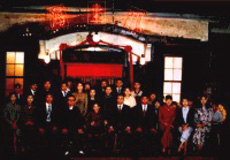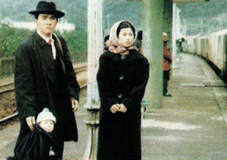|
Newest Reviews:
New Movies -
The Tunnel
V/H/S
The Tall Man
Mama Africa
Detention
Brake
Ted
Tomboy
Brownian Movement
Last Ride
[Rec]≥: Genesis
Hara-Kiri: Death of a Samurai
Indie Game: The Movie
Abraham Lincoln: Vampire Hunter
Old Movies -
Touki Bouki: The Journey of the Hyena
Drums Along the Mohawk
The Chase
The Heiress
Show
People
The Strange Affair of Uncle Harry
Pitfall
Driftwood
Miracle Mile
The Great Flamarion
Dark Habits
Archives -
Recap: 2000,
2001, 2002,
2003, 2004
, 2005, 2006,
2007 , 2008
, 2009 ,
2010 , 2011 ,
2012
All reviews alphabetically
All reviews by star rating
All reviews by release year
Masterpieces
Screening Log
Links
FAQ
E-mail me
HOME
| |
City of Sadness (Hou Hsiao-Hsien, 1989)
 The first film in Taiwanese director Hou Hsiao-Hsienís
trilogy about his countryís modern history, City
of Sadness is an ambitiously conceived, sometimes frustratingly elliptical
family chronicle that shows one familyís experience immediately following the
Japanese occupation of the nation. At times the scope of the film, which spans
from 1945 to 1949 and includes dozens of characters, makes things difficult to
keep track of, but even when the significance of the action on screen isnít
abundantly clear (though a few scenes later, things always click into place),
the considerable atmosphere that Hou creates keeps the mind from wandering.
Houís strict formalism, which never uses sudden camera movements, belies the
decidedly naturalistic feel here. By taking the time to observe, he shows us
things that other filmmakers would edit out, and makes the world one that seems
to contain a life of its own. Though City
of Sadness is expressly political, it doesnít present its politics in
didactic terms. They instead are infused into the same worldview, creating a
feeling that to this family politics are important, but not of utmost
importance, even as they wreak havoc upon life as they know it. His mixture of
naturalism and political acuity is such an effective, intoxicating equation that
heís able to plug in a movie star like Tony Leung, who plays Wen-Ching a
deaf-mute who is one of four brothers in the family, without sacrificing any of
the realistic feel. Houís spontaneous, impressively choreographed fight scenes
are particularly of note here in the same respect, because they completely dodge
any of the sensationalism that nearly every other director indulges in without
sacrificing excitement. I can think of few directors who need to strive less to
achieve a desired effect than Hou, and thatís perhaps best demonstrated when City
of Sadness attempts to achieve poignancy.
The first film in Taiwanese director Hou Hsiao-Hsienís
trilogy about his countryís modern history, City
of Sadness is an ambitiously conceived, sometimes frustratingly elliptical
family chronicle that shows one familyís experience immediately following the
Japanese occupation of the nation. At times the scope of the film, which spans
from 1945 to 1949 and includes dozens of characters, makes things difficult to
keep track of, but even when the significance of the action on screen isnít
abundantly clear (though a few scenes later, things always click into place),
the considerable atmosphere that Hou creates keeps the mind from wandering.
Houís strict formalism, which never uses sudden camera movements, belies the
decidedly naturalistic feel here. By taking the time to observe, he shows us
things that other filmmakers would edit out, and makes the world one that seems
to contain a life of its own. Though City
of Sadness is expressly political, it doesnít present its politics in
didactic terms. They instead are infused into the same worldview, creating a
feeling that to this family politics are important, but not of utmost
importance, even as they wreak havoc upon life as they know it. His mixture of
naturalism and political acuity is such an effective, intoxicating equation that
heís able to plug in a movie star like Tony Leung, who plays Wen-Ching a
deaf-mute who is one of four brothers in the family, without sacrificing any of
the realistic feel. Houís spontaneous, impressively choreographed fight scenes
are particularly of note here in the same respect, because they completely dodge
any of the sensationalism that nearly every other director indulges in without
sacrificing excitement. I can think of few directors who need to strive less to
achieve a desired effect than Hou, and thatís perhaps best demonstrated when City
of Sadness attempts to achieve poignancy.
 What becomes apparent from watching Houís films, and this
one in particular, is that environment has a direct effect on character
development in his work. Perhaps this is because itís almost impossible for
the Taiwanese people to separate themselves from their national identity. For it
to have survived so much is a testament to its durability. Though Hou creates
dynamic, interesting protagonists, they arenít heroes in the conventional
sense, and coming to terms with that takes a while for a viewer who isnít
accustomed to his approach (this might be why his movies usually seem better in
retrospect or after a second viewing). Though the civil upheaval that occurs
during the movieís time span is almost nonstop, the insularity of the
characters largely shields the audience from it. Political involvement
frequently arises as a side effect from personal involvement. Similarly, the
crisis of non-communicativeness that afflicted the country at the time (a side
effect of the sudden influx of people who speak different languages and
dialects) is represented mostly in personal terms. Communication always must
overcome obstacles in City of Sadness.
Thereís a disconnect between the thoughts that the characters have and the
words that they say. Whether they must be presented verbally to others through
translators, written on the tablet that the mute Wen-Ching uses to speak, or are
not able to be spoken at all like Hinomeís soul-baring diary entries, the
layers of translation only insure that something is lost before another
understands the speakerís intentions. When Hou applies these lapses to the
countryís political predicament, the reasons for friction become apparent. All
the same, his conceptualization of the period is smart enough to see that bonds
still could form despite any such obstacles. An early scene which shows a
Japanese woman as she says goodbye to a Taiwanese friend before her country
withdraws from the nation that it once controlled is deeply affecting and pushes
the film away from simple condemnations. The mixture of discontent with the
Taiwanese past and the desire to embrace it for making the country what it
currently is that exists in City of
Sadness paints a distinctly schizophrenic portrait of the nationís
identity. Perhaps no other attitude would make sense given the nationís
history.
What becomes apparent from watching Houís films, and this
one in particular, is that environment has a direct effect on character
development in his work. Perhaps this is because itís almost impossible for
the Taiwanese people to separate themselves from their national identity. For it
to have survived so much is a testament to its durability. Though Hou creates
dynamic, interesting protagonists, they arenít heroes in the conventional
sense, and coming to terms with that takes a while for a viewer who isnít
accustomed to his approach (this might be why his movies usually seem better in
retrospect or after a second viewing). Though the civil upheaval that occurs
during the movieís time span is almost nonstop, the insularity of the
characters largely shields the audience from it. Political involvement
frequently arises as a side effect from personal involvement. Similarly, the
crisis of non-communicativeness that afflicted the country at the time (a side
effect of the sudden influx of people who speak different languages and
dialects) is represented mostly in personal terms. Communication always must
overcome obstacles in City of Sadness.
Thereís a disconnect between the thoughts that the characters have and the
words that they say. Whether they must be presented verbally to others through
translators, written on the tablet that the mute Wen-Ching uses to speak, or are
not able to be spoken at all like Hinomeís soul-baring diary entries, the
layers of translation only insure that something is lost before another
understands the speakerís intentions. When Hou applies these lapses to the
countryís political predicament, the reasons for friction become apparent. All
the same, his conceptualization of the period is smart enough to see that bonds
still could form despite any such obstacles. An early scene which shows a
Japanese woman as she says goodbye to a Taiwanese friend before her country
withdraws from the nation that it once controlled is deeply affecting and pushes
the film away from simple condemnations. The mixture of discontent with the
Taiwanese past and the desire to embrace it for making the country what it
currently is that exists in City of
Sadness paints a distinctly schizophrenic portrait of the nationís
identity. Perhaps no other attitude would make sense given the nationís
history.
* * * *
12-09-02
Jeremy Heilman
|